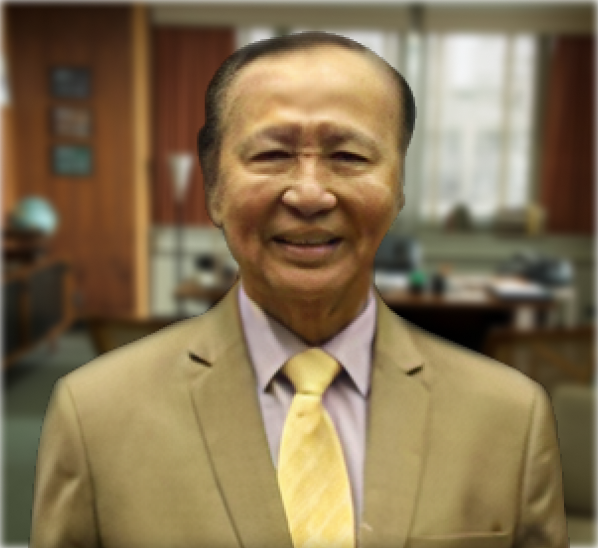- KRASAE found the official health building in Muang Phon dilapidated and ill-equipped. He first cleaned and whitewashed the old building, gave good service, and encouraged people to discuss their problems with him in and outside the clinic.
- Then, by example of his hard work, attention to their larger welfare, and persuasion, he set out to induce every citizen to contribute one baht (five U.S. cents) toward the construction of a new health center.
- The Muang Phon family planning program, with similarly wide community participation, is a model for the kingdom.
- The RMAF Board of Trustees recognizes him for demonstrating that a doctor dedicated to service can overcome the most stubborn of obstacles in bringing effective health services to neglected and impoverished rural people.
Renouncing professional and material attractions that draw so many doctors to city practice, KRASAE CHANAWONGSE chose service in Muang Phon, the rural municipality where he was born. Prospects were not promising for his home—in Khon Kaen Province some 336 kilometers northeast of Bangkok—is in the bleakest region of Thailand. Red, infertile, salty earth bakes hard in the long, searingly hot summers. Farmers in this Thai-Lao border area live precariously, raising mainly rice and jute with little irrigation. Per capita annual income is about US$55, or less than half the national average.
Classmates and relatives expected KRASAE to seek escape from hardship. One of eight children of a poor family, he left school at age 13. Apprenticed in a lumber shop without pay, he earned cash after hours selling rainwater for drinking to passengers at the nearby railway station. Befriended by the school principal, he later completed secondary school while working as a delivery boy. With his brother paying the tuition and the assemblyman from the Province allowing him to live in his house, KRASAE continued his studies in Bangkok. He graduated from Siriraj Hospital, University of Medical Sciences, in 1960 at the age of 26.
In medical school, thinking of 140,000 people in Phon District with endemic illnesses, treatable diseases and infections, and no doctor, he determined to serve them.
KRASAE found the official health building in Muang Phon dilapidated and ill-equipped. He first cleaned and whitewashed the old building, gave good service, and encouraged people to discuss their problems with him in and outside the clinic. Then, by example of his hard work, attention to their larger welfare, and persuasion, he set out to induce every citizen to contribute one baht (five U.S. cents) toward construction of a new health center. Municipal councilors, village headmen, teachers and policemen helped. Even poor people he had treated responded with more than asked. Merchants joined in giving. Today the community has its own First Class Health Center with a small hospital and modest, modern facilities. Unpaid volunteers enlist for training and for regular service, preparing clinic patients for examination and other non-medical work. The Muang Phon family planning program, with similarly wide community participation, is a model for the kingdom.
In his 12-year crusade for sanitation, preventive medicine and curative treatment within the means of his Health Center, KRASAE has established a rare rapport with his remote community and has educated the people to a new and vital awareness of what they can do for themselves with meager means. He has earned their love and pride by his ennobling example.
In electing KRASAE CHANAWONGSE to receive the 1973 Ramon Magsaysay Award for Community Leadership, the Board of Trustees recognizes him for demonstrating that a doctor dedicated to service can overcome the most stubborn of obstacles in bringing effective health services to neglected and impoverished rural people.
It gives me great pleasure to stand before you today, to have the opportunity of once more seeing the Philippines—the “Pearl of the Orient,†especially the beautiful Bay of Manila—and to meet again your proud and charming people. This is my third visit to the Philippines but never before have I been here in such exciting circumstances.
I am indeed very pleased to be the recipient of the Ramon Magsaysay Award. It never occurred to me that I should receive such a great honor. It is far more than I could ever have hoped for in my position as a doctor in rural Thailand.
I am even more impressed by the greatness of the honor given me when I consider the man—Ramon Magsaysay. His selfless devotion to the task of improving the lot of his countrymen is an inspiration to the whole world, and my receiving this Award has again brought to the notice of the Thai people this great man and the principles he stood for—principles of freedom and democracy and of the importance and dignity of every individual person.
I must say that I admire the diplomatic way of working employed by the Board of Trustees of the Ramon Magsaysay Award Foundation. Usually, competitors receive the prize when the race is finished. For me, this prize doesn’t mean the end of the race but it will be a spur to even greater endeavor on behalf of the people of Muang Phon, and, therefore, of the vast population of rural Thailand.
In concluding, I would like to thank sincerely all concerned, and as their representative to convey the goodwill of the people of Muang Phon to the people of the Philippines.

